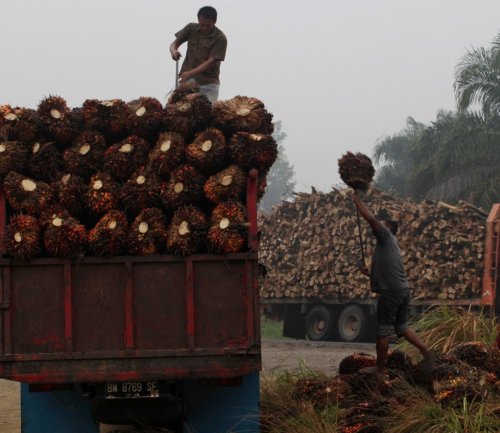
Jakarta Globe | October 23, 2013
Indonesia to prioritize palm oil in talks with EU
By Tito Summa Siahaan
The Indonesian government has made it clear that the inclusion of palm-oil products is at the top of its priorities in the talks on a comprehensive economic partnership agreement with the European Union, suggesting that an deal may not be possible without some compromise.
According to Deputy Trade Minister Bayu Khrisnamurti, talks on the CEPA can only be concluded when the interests of both parties are accommodated, which for Indonesia means the removal of barriers for palm-oil products to enter the 28-country EU market.
He was speaking during the European-Indonesian business dialogue in Jakarta on Tuesday.
The government conceded that entry to the European market must be based on following the stringent standards set by the EU.
He said the government was looking to replicate the success of timber legality verification system (SVLK), which will allow Indonesian timber and timber products to enter the EU market.
“We want to embrace the success in handling timber issues to palm-oil products,” Bayu added.
“We can use the SVLK as a model,” Bayu said, referring to a set of guidelines established to verify the legality of timber and timber products before entering the EU market.
“There must be extra efforts, because the EU set a high standard,” said Chris Kanter, a deputy chairman at the Indonesian Chamber of Commerce and Industry.
Fadhil Hasan, executive director of the Indonesian Palm Oil Association, said Indonesia constantly encounters barriers in its bid to gain entry to Europe. The most recent was the allegation that the government was subsidizing biofuel production, he added.
As a consequence, Indonesia’s exports of palm-oil products had fallen, Fadhil said. According to data from the association, the country exported 260,740 tons of palm oil and related products in September, a 27.4 percent drop from the August figure.
The CEPA between Indonesia and the EU seeks improvement in market access, capacity building and an increase in trade and investment.
On trade, CEPA aims for the gradual tariff reduction within nine years, eliminating 95 percent of tariffs and possibly also the remaining 5 percent.
The EU estimated that the implementation of the CEPA could boost Indonesia’s exports by $9.8 billion and add another $6.3 billion to the country’s GDP. In comparison, Indonesia’s non oil and gas export was $98 billion in the first eight months this year and $152 billion last year.
Olog Skoog, the EU ambassador to Indonesia, said the EU understands the Indonesian government’s agenda on palm oil, but that the benefit of the CEPA was greater on that particular issue. He highlighted that Indonesia had yet to capture a fair share of investment from EU members.
During the period 2004-2010, Indonesia only accounted for 6 percent of European investment in the Southeast Asia, while the bilateral trade figure of 25 billion euro ($34.1 billion) in 2012 was below Singapore’s 52 billion euro, Malaysia’s 35 billion euro and Thailand’s 32 billion euro.